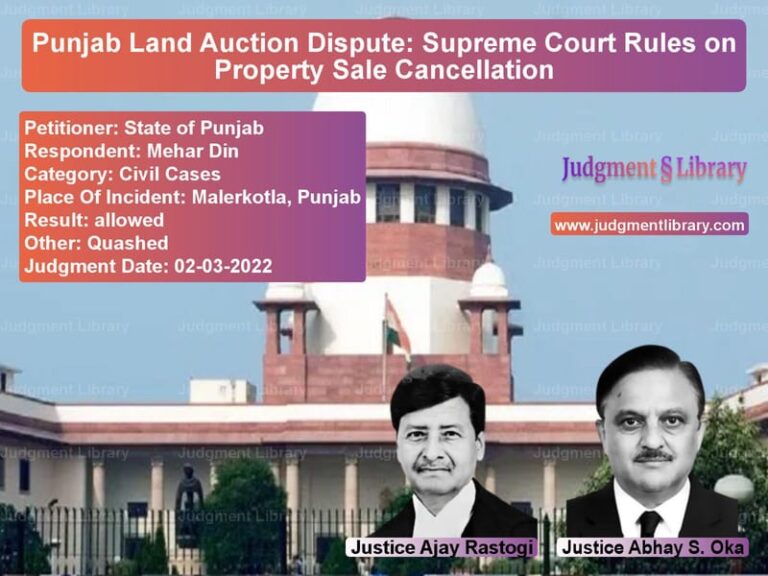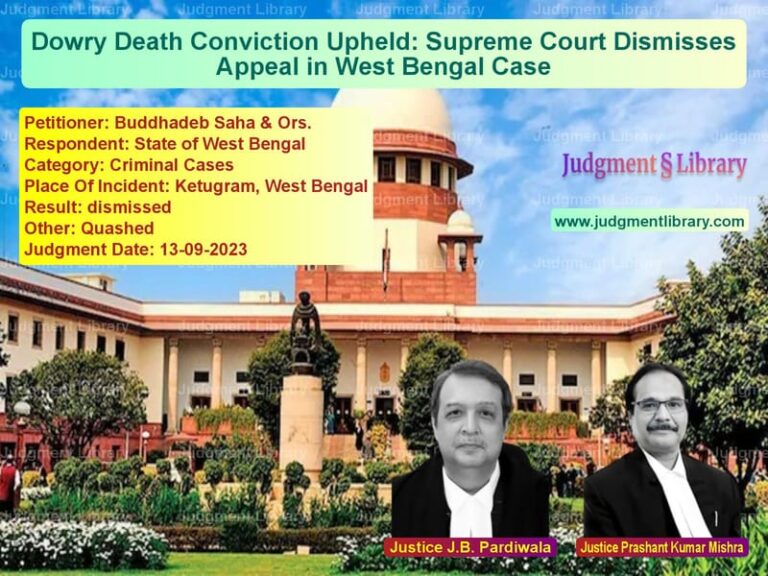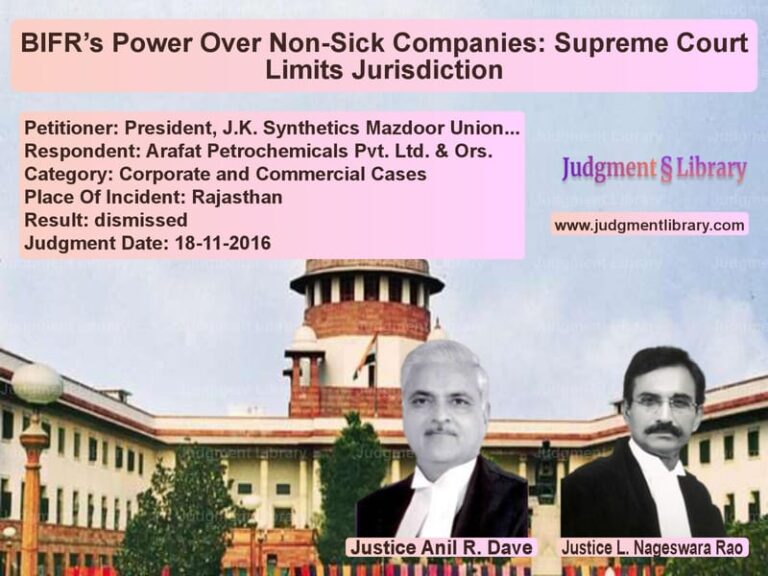Supreme Court Acquits Two Brothers in Rajasthan Assault Case
The Supreme Court of India, in the case of Bhagwan Sahai & Anr. v. State of Rajasthan, ruled on an appeal challenging the conviction of two brothers in an assault case. The Court set aside their conviction under Sections 308/34, 323, and 324 IPC, granting them the benefit of doubt due to the prosecution’s failure to explain the injuries sustained by the accused and the death of their father.
Background of the Case
The case involved an altercation between two groups in a village in Rajasthan on May 4, 2008. The appellants, Bhagwan Sahai and Satish, were accused of forming an unlawful assembly with female family members and attacking the complainant’s family. The prosecution alleged that they caused injuries to multiple persons, including:
- Sajana Devi – Injuries with a blunt weapon
- Jagram and Malli Devi – Injuries with blunt and incised weapons
- Kailash Chand – Simple and grievous injuries
The trial court convicted the appellants under Sections 307, 326, 323, and 324 IPC. However, the Rajasthan High Court reduced the conviction to Section 308/34 IPC (attempt to commit culpable homicide) while maintaining convictions under Sections 323 and 324 IPC.
Arguments by the Appellants
- The appellants contended that they acted in self-defense as their father, Kanchan Lal, was attacked by the complainant’s group and later succumbed to his injuries.
- The prosecution failed to explain the injuries sustained by the accused, including severe wounds suffered by their father.
- The case involved a free fight, and it was impossible to determine the aggressor.
- The High Court erroneously convicted them despite acknowledging that both parties had suffered injuries.
Arguments by the Respondent (State of Rajasthan)
- The prosecution maintained that the appellants had initiated the attack due to an old enmity.
- There was sufficient evidence, including medical reports, proving that they inflicted injuries on the complainant’s family.
- The trial court had properly convicted them based on the testimony of multiple witnesses.
Supreme Court’s Observations
1. Prosecution’s Failure to Explain Injuries
The Court noted that the prosecution had suppressed material facts, including the fatal injuries sustained by Kanchan Lal, father of the appellants:
“Once the Court came to a finding that the prosecution has suppressed the genesis and origin of the occurrence and also failed to explain the injuries on the person of the accused, including the death of their father, the only possible course left open was to grant benefit of doubt to the appellants.”
2. Applicability of Right to Private Defense
The Court held that the appellants had a legitimate right to use force when they saw their parents being assaulted:
“The appellants can legitimately claim the right to use force once they saw their parents being assaulted, and when it has been shown that due to such assault, their father subsequently died.”
3. Free Fight Between Both Parties
The High Court had treated the incident as a ‘free fight’ without identifying the initial aggressor. The Supreme Court rejected this reasoning:
“The High Court proceeded to convict the appellants on the misconceived ground that since both parties had withheld the origin and genesis of the occurrence, the case had to be decided against the accused.”
The Court emphasized that when an altercation involves injuries on both sides, and the prosecution fails to explain them, the accused must be given the benefit of doubt.
Supreme Court’s Final Decision
- The appeal was allowed, and the appellants were acquitted of all charges.
- They were ordered to be released from custody immediately, provided they were not required in any other case.
- The conviction under Sections 308/34, 323, and 324 IPC was set aside.
- The Court directed that adverse inferences must be drawn against the prosecution for failing to explain injuries on the accused side.
Implications of the Judgment
1. Strengthening the Right to Private Defense
The judgment reinforces that individuals have the right to defend themselves and their family members against unlawful attacks.
2. Requirement for Prosecution to Explain Injuries
The ruling establishes that when both sides suffer injuries, the prosecution must explain them; otherwise, the accused must be given the benefit of doubt.
3. Fair Trial and Evidentiary Standards
The decision highlights that courts must carefully examine all available evidence before convicting individuals in assault cases.
Conclusion
The Supreme Court’s ruling in Bhagwan Sahai v. State of Rajasthan is a significant decision in criminal law. By acquitting the appellants and emphasizing the failure of the prosecution to present a full account of the incident, the Court upheld the fundamental principles of justice and fairness. This judgment serves as a precedent in cases where the right to private defense is invoked, ensuring that accused persons are not wrongfully convicted in the absence of conclusive evidence.
Don’t miss out on the full details! Download the complete judgment in PDF format below and gain valuable insights instantly!
Download Judgment: Bhagwan Sahai & Anr. vs State of Rajasthan Supreme Court of India Judgment Dated 03-06-2016-1741872321674.pdf
Direct Downlaod Judgment: Direct downlaod this Judgment
See all petitions in Custodial Deaths and Police Misconduct
See all petitions in Judgment by Dipak Misra
See all petitions in Judgment by Shiva Kirti Singh
See all petitions in allowed
See all petitions in Quashed
See all petitions in supreme court of India judgments June 2016
See all petitions in 2016 judgments
See all posts in Criminal Cases Category
See all allowed petitions in Criminal Cases Category
See all Dismissed petitions in Criminal Cases Category
See all partially allowed petitions in Criminal Cases Category







